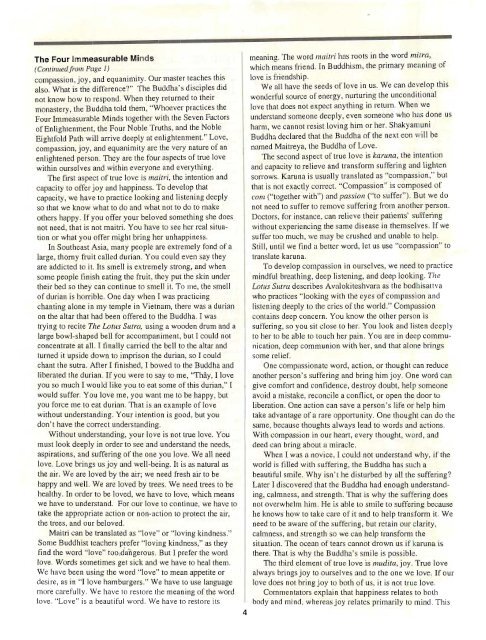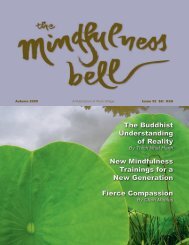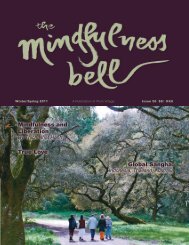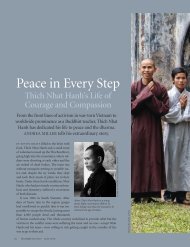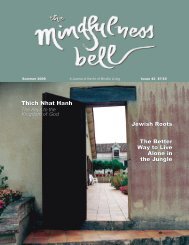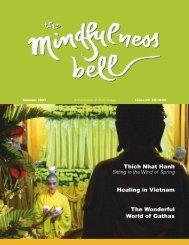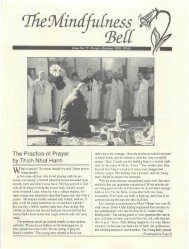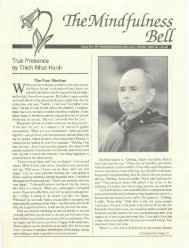View full issue in PDF - The Mindfulness Bell
View full issue in PDF - The Mindfulness Bell
View full issue in PDF - The Mindfulness Bell
You also want an ePaper? Increase the reach of your titles
YUMPU automatically turns print PDFs into web optimized ePapers that Google loves.
<strong>The</strong> Four Immeasurable M<strong>in</strong>ds<br />
(Cont<strong>in</strong>uedfrom Page 1)<br />
compassion, joy, and equanimity. Our master teaches this<br />
also. What is the difference?" <strong>The</strong> Buddha' s disciples did<br />
not know how to respond. When they returned to their<br />
monastery, the Buddha told them, "Whoever practices the<br />
Four Immeasurable M<strong>in</strong>ds together with the Seven Factors<br />
of Enlightenment, the Four Noble Truths, and the Noble<br />
Eightfold Path will arrive deeply at enlightenment." Love,<br />
compassion, joy, and equanimity are the very nature of an<br />
enlightened person. <strong>The</strong>y are the four aspects of true love<br />
with<strong>in</strong> ourselves and with<strong>in</strong> everyone and everyth<strong>in</strong>g.<br />
<strong>The</strong> first aspect of true love is maitri, the <strong>in</strong>tention and<br />
capacity to offer joy and happ<strong>in</strong>ess. To develop that<br />
capacity, we have to practice look<strong>in</strong>g and listen<strong>in</strong>g deeply<br />
so that we know what to do and what not to do to make<br />
others happy. If you offer your beloved someth<strong>in</strong>g she does<br />
not need, that is not maitri. You have to see her real situation<br />
or what you offer might br<strong>in</strong>g her unhapp<strong>in</strong>ess.<br />
In Southeast Asia, many people are extremely fond of a<br />
large, thorny fruit called durian. You could even say they<br />
are addicted to it. Its smell is extremely strong, and when<br />
some people f<strong>in</strong>ish eat<strong>in</strong>g the fruit, they put the sk<strong>in</strong> under<br />
their bed so they can cont<strong>in</strong>ue to smell it. To me, the smell<br />
of durian is horrible. One day when I was practic<strong>in</strong>g<br />
chant<strong>in</strong>g alone <strong>in</strong> my temple <strong>in</strong> Vietnam, there was a durian<br />
on the altar that had been offered to the Buddha. I was<br />
try<strong>in</strong>g to recite <strong>The</strong> Lotus Sutra, us<strong>in</strong>g a wooden drum and a<br />
large bowl-shaped bell for accompaniment, but I could not<br />
concentrate at all. I f<strong>in</strong>ally carried the bell to the altar and<br />
turned it upside down to imprison the durian, so I could<br />
chant the sutra. After I f<strong>in</strong>ished, I bowed to the Buddha and<br />
liberated the durian. If you were to say to me, "Thay, I love<br />
you so much I would like you to eat some of this durian," I<br />
would suffer. You love me, you want me to be happy, but<br />
you force me to eat durian. That is an example of love<br />
without understand<strong>in</strong>g. Your <strong>in</strong>tention is good, but you<br />
don't have the correct understand<strong>in</strong>g.<br />
Without understand<strong>in</strong>g, your love is not true love. You<br />
must look deeply <strong>in</strong> order to see and understand the needs,<br />
aspirations, and suffer<strong>in</strong>g of the one you love. We all need<br />
love. Love br<strong>in</strong>gs us joy and well-be<strong>in</strong>g. It is as natural as<br />
the air. We are loved by the air; we need fresh air to be<br />
happy and well. We are loved by trees. We need trees to be<br />
healthy. In order to be loved, we have to love, which means<br />
we have to understand. For our love to cont<strong>in</strong>ue, we have to<br />
take the appropriate action or non-action to protect the air,<br />
the trees, and our beloved.<br />
Maitri can be translated as "love" or "lov<strong>in</strong>g k<strong>in</strong>dness."<br />
Some Buddhist teachers prefer "lov<strong>in</strong>g k<strong>in</strong>dness," as they<br />
f<strong>in</strong>d the word "love" too ld·angerous. But I prefer the word<br />
love. Words sometimes get sick and we have to heal them.<br />
We have been us<strong>in</strong>g the word "love" to mean appetite or<br />
desire, as <strong>in</strong> "I love hamburgers." We have to use language<br />
more care<strong>full</strong>y. We have to restore the mean<strong>in</strong>g of the word<br />
love. "Love" is a beautiful word. We have to restore its<br />
mean<strong>in</strong>g. <strong>The</strong> word maitri has roots <strong>in</strong> the word mitra,<br />
which means friend. In Buddhism, the primary mean<strong>in</strong>g of<br />
love is friendship.<br />
We all have the seeds of love <strong>in</strong> us. We can develop this<br />
wonderful source of energy, nurtur<strong>in</strong>g the unconditional<br />
love that does not expect anyth<strong>in</strong>g <strong>in</strong> return. When we<br />
understand someone deeply, even someone who has done us<br />
harm, we cannot resist lov<strong>in</strong>g him or her. Shakyamuni<br />
Buddha declared that the Buddha of the next eon will be<br />
named Maitreya, the Buddha of Love.<br />
<strong>The</strong> second aspect of true love is karuna , the <strong>in</strong>tention<br />
and capacity to relieve and transform suffer<strong>in</strong>g and lighten<br />
sorrows. Karuna is usually translated as "compassion," but<br />
that is not exactly correct. "Compassion" is composed of<br />
com ("together with") and passion ("to suffer"). But we do<br />
not need to suffer to remove suffer<strong>in</strong>g from another person.<br />
Doctors, for <strong>in</strong>stance, can relieve their patients' sufferIng<br />
without experienc<strong>in</strong>g the same disease <strong>in</strong> themselves. If we<br />
suffer too much, we may be crushed and unable to help.<br />
Still, until we f<strong>in</strong>d a better word, let us use "compassion" to<br />
translate karuna.<br />
To develop compassion <strong>in</strong> ourselves, we need to practice<br />
m<strong>in</strong>dful breath<strong>in</strong>g, deep listen<strong>in</strong>g, and deep look<strong>in</strong>g. <strong>The</strong><br />
Lotus Sutra describes A valokiteshvara as the bodhisattva<br />
who practices "look<strong>in</strong>g with the eyes of compassion and<br />
listen<strong>in</strong>g deeply to the cries of the world." Compassion<br />
conta<strong>in</strong>s deep concern. You know the other person is<br />
suffer<strong>in</strong>g, so you sit close to her. You look and listen deeply<br />
to her to be able to touch her pa<strong>in</strong>. You are <strong>in</strong> deep communication,<br />
deep communion with her, and that alone br<strong>in</strong>gs<br />
some relief.<br />
One compassionate word, action, or thought can reduce<br />
another person's suffer<strong>in</strong>g and br<strong>in</strong>g him joy. One word can<br />
give comfort and confidence, destroy doubt, help someone<br />
avoid a mistake, reconcile a conflict, or open the door to<br />
liberation. One action can save a person's life or help him<br />
take advantage of a rare opportunity. One thought can do the<br />
same, because thoughts always lead to words and actions.<br />
With compassion <strong>in</strong> our heart, every thought, word, and<br />
deed can br<strong>in</strong>g about a miracle.<br />
When I was a novice, I could not understand why, if the<br />
world is filled with suffer<strong>in</strong>g, the Buddha has such a<br />
beautiful smile. Why isn't he disturbed by all the suffer<strong>in</strong>g?<br />
Later I discovered that the Buddha had enough understand<strong>in</strong>g,<br />
calmness, and strength. That is why the suffer<strong>in</strong>g does<br />
not overwhelm him. He is able to smile to suffer<strong>in</strong>g because<br />
he knows how to take care of it and to help transform it. We<br />
need to be aware of the suffer<strong>in</strong>g, but reta<strong>in</strong> our clarity,<br />
calmness, and strength so we can help transform the<br />
situation. <strong>The</strong> ocean of tears cannot drown us if karuna is<br />
there. That is why the Buddha's smile is possible.<br />
<strong>The</strong> third element of true love is mudita, joy. True love<br />
always br<strong>in</strong>gs joy to ourselves and to the one we love. If our<br />
love does not br<strong>in</strong>g joy to both of us, it is not true love.<br />
Commentators expla<strong>in</strong> that happ<strong>in</strong>ess relates to both<br />
body and m<strong>in</strong>d, whereas joy relates primarily to m<strong>in</strong>d. This<br />
4


